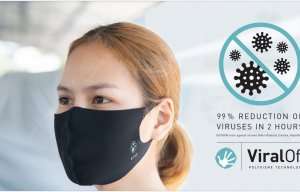
Polygiene launches ViralOff antiviral technology
Nanocellulose filter paper was termed mille-feuille filter, due to the layered structure resembling French pastry mille-feuille.

8th June 2016
Innovation in Textiles
|
Lubbock, TX
Nanocellulose filter paper termed as mille-feuille filter, due to the layered structure resembling French pastry mille-feuille, will be able to remove even small sized viruses, according to Uppasala University.
This new structured nanocellulose sheets are affordable filters that not only can remove viruses but also can have long life, scientists report. Compared to tea bag kind of cellulose filters, these French pastry structured filters have pore structures that can filter viruses that are normally resistant to physical and chemical countermeasure processes.
Uppasala team was led by Albert Mihranyan, Professor at the Department of Engineering Sciences, Nano Technology and Functional Materials, in collaboration with virologists from Charles River Biopharmaceutical Services, Cologne, Germany. According to Professor Mihranyan, their goal is to develop filter paper that can remove viruses from water as easily as brewing coffee.
Nanocellulose is a wide-ranging family of materials that consist of cellulose that has been processed in a special way to produce nanofibres or nanostructures that are strong and have a large surface area.
Their properties can vary. This depends on how the nanocellulose is produced and the source from which it has been extracted, the surface charge, the molecular groups that are grafted on, and the length and thickness of the fibres can differ.
The cellulose comes from Swedish forests or algae harvested in the Baltic Sea. Another source is cellulose produced bacterially.
Earlier in 2014, researchers at the Uppsala University presented filters that are said to be able to capture large sized viruses such as influenza virus with an efficiency matching that of the best industrial virus filters.
“Viral contamination of biotechnological products is a serious challenge for production of therapeutic proteins and vaccines. Because of the small size, virus removal is a non-trivial task, and, therefore, inexpensive and robust virus removal filters are highly demanded,” commented Albert Mihranyan, who led the study.
The research was carried out in collaboration with virologists from the Swedish University of Agricultural Sciences/Swedish National Veterinary Institute and was published in the Advanced Healthcare Materials journal.

Business intelligence for the fibre, textiles and apparel industries: technologies, innovations, markets, investments, trade policy, sourcing, strategy...
Find out more